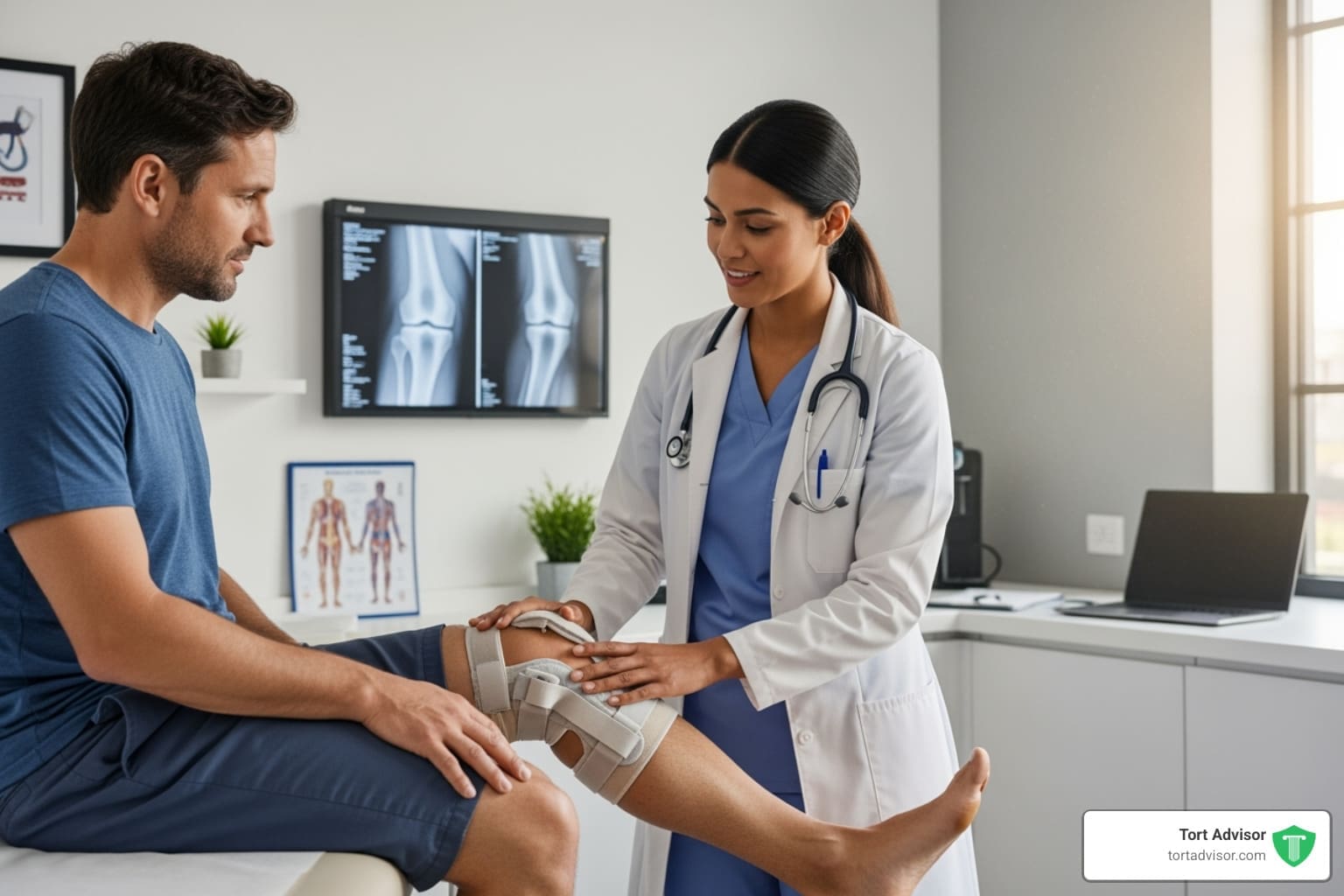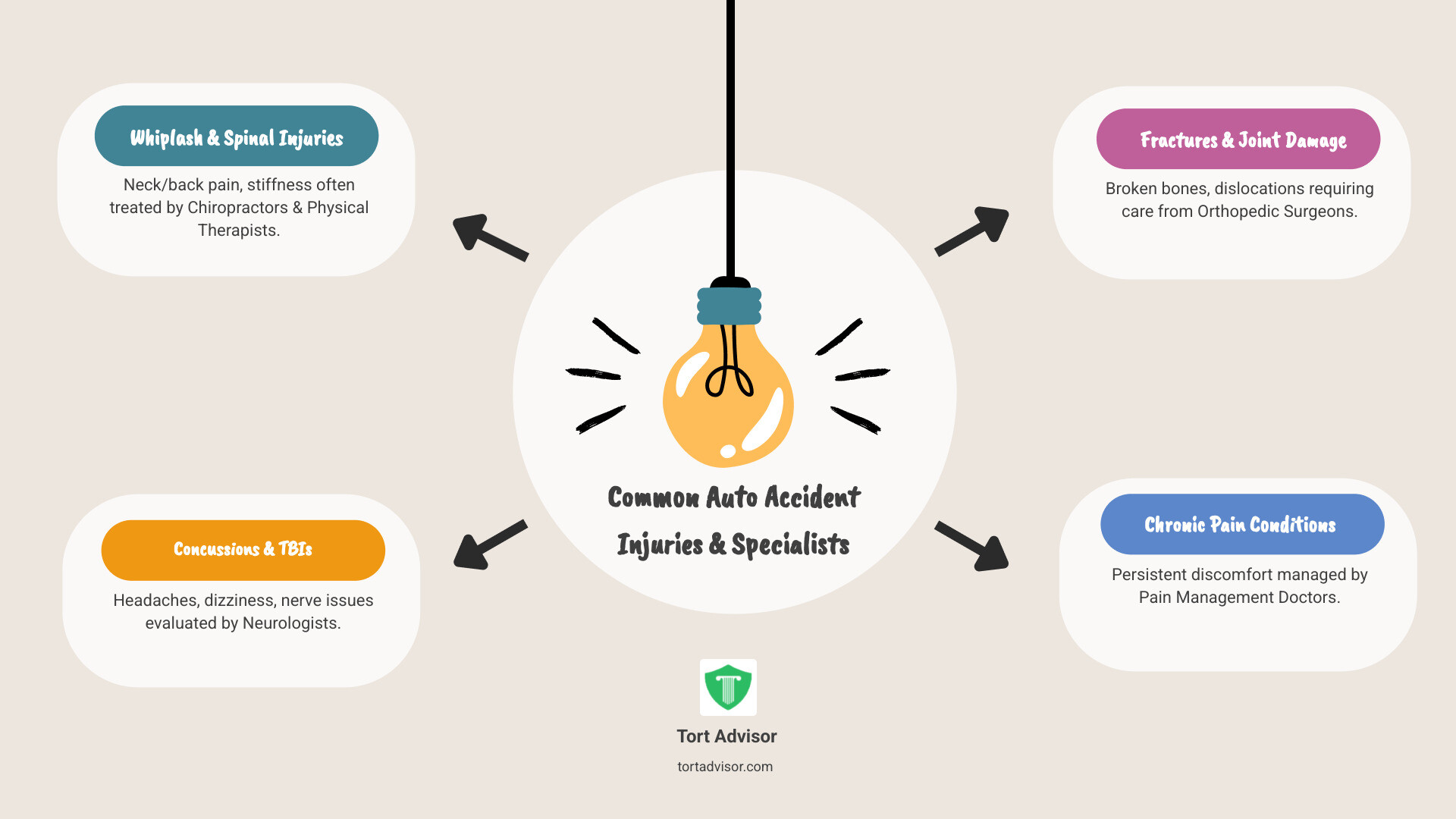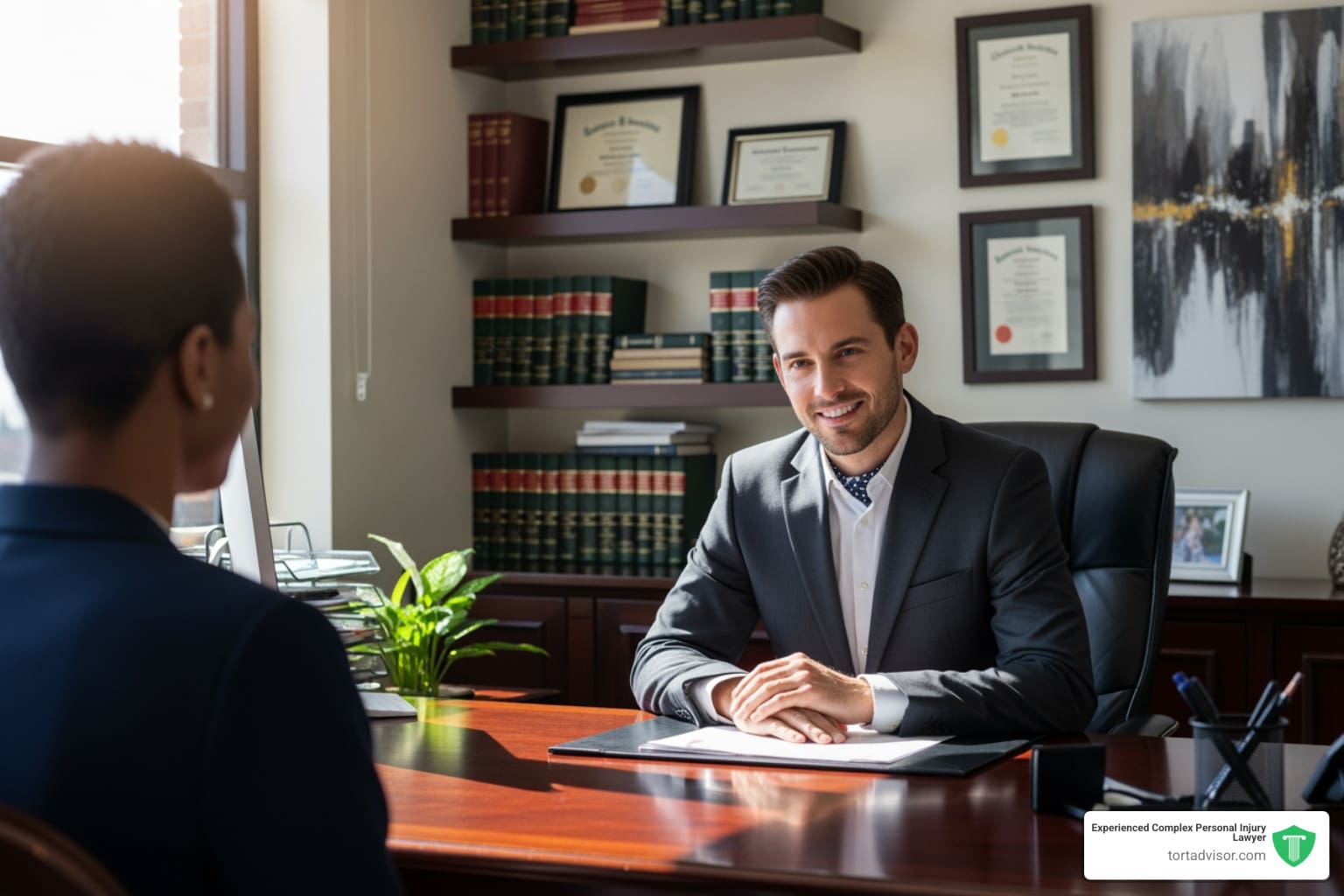


Understanding the Role of an Auto Accident Injury Specialist
An auto accident injury specialist is a medical professional who focuses on diagnosing and treating injuries specific to car crashes. If you’ve been in a car accident and are looking for expert medical care, these specialists are key. They include:
- Orthopedic Surgeons: For broken bones, joints, and muscular injuries.
- Neurologists: For head trauma, concussions, and nerve damage.
- Chiropractors: For whiplash, neck, and back pain.
- Physical Therapists: For rehabilitation and restoring movement.
- Pain Management Doctors: For chronic pain resulting from accidents.
Car accidents can be life-altering events. They cause both immediate and long-term health issues. Even minor collisions can lead to serious injuries. These problems are not always clear right away.
Many times, initial shock and adrenaline mask pain. Symptoms may show up hours, days, or even weeks later. This is why getting specialized medical care is so important.
It’s crucial to find a doctor who truly understands car accident injuries. They can spot hidden problems. They can also create the right treatment plan for a full recovery.
I’m Mason Arnao, and I have a deep background in technology and internet marketing. My experience in data management and lead generation has given me unique insights into how critical specialized care and proper documentation are for those dealing with auto accident injury cases.
Why You Need a Specialist, Not Just Your Family Doctor
When you’ve been in a car accident, your body goes through a lot. Even if you feel okay right after the crash, the aftermath can be a confusing and agonizing time. Many people know they need to see a doctor, but which one? We’re here to tell you that an auto accident injury specialist is often your best bet.
The Critical First 72 Hours: Why Immediate Evaluation Matters
The first few days after a car accident are incredibly important for your health and your legal rights. Why? Because many serious injuries, such as whiplash, concussions, soft tissue damage, hairline fractures, and even internal bleeding, might not show symptoms immediately. The initial shock and adrenaline can mask the pain, making you feel deceptively fine. Symptoms can emerge hours, days, or even weeks later.
This delayed onset of pain means that if you wait to seek medical attention, hidden injuries can worsen, potentially leading to chronic pain and long-term issues. For instance, micro-tears in muscles, if left untreated, can lead to scar tissue and degeneration. Early intervention is key to preventing long-term complications and ensuring the best possible recovery.
Beyond your health, there are crucial legal and insurance reasons for seeking prompt medical care. In some states, like Florida, there’s a strict 14-day rule for Personal Injury Protection (PIP) insurance claims. If you don’t seek treatment for your injuries within 14 days of your accident, you could forfeit your PIP benefits. This is a critical deadline that can significantly impact your ability to cover medical expenses. Therefore, scheduling an injury screening quickly ensures you receive proper care and protect your potential compensation.
The Limits of Primary Care Physicians in Accident Cases
While your primary care physician (PCP) is a wonderful generalist, they may not be the ideal choice for auto accident injuries, and here’s why:
- Lack of Specialization: PCPs typically don’t specialize in the specific types of trauma sustained in car accidents. They might miss subtle signs of whiplash, concussions, or soft tissue damage that an auto accident injury specialist would immediately recognize. Their focus is often on general health, not the complex biomechanics of crash injuries.
- Billing Problems: A significant unique insight from our research is that many primary care doctors are not set up to accept Personal Injury Protection (PIP) insurance or third-party billing. This means they may not want to deal with auto insurance companies directly, leaving you with out-of-pocket costs or difficulty getting your bills covered.
- Reluctance to Engage in Legal Cases: Some doctors simply do not treat car accident injuries because they don’t want to be asked to testify in court, or they are not set up to bill auto insurance companies. In fact, a startling statistic reveals that 70% to 80% of injury doctors don’t treat auto wreck traffic or work accident victims. This means finding a specialist who does accept these cases is paramount for your recovery and any potential legal claims.
An auto accident injury specialist, on the other hand, understands the unique medical and administrative complexities of car accident cases. They are equipped to handle the specialized documentation required for insurance claims and legal proceedings, ensuring your care is properly recorded and recognized.
The Team of Experts: Who Is an Auto Accident Injury Specialist?
When you’ve been in a car accident, your recovery isn’t usually a one-person job. Think of an auto accident injury specialist not as a single doctor, but as a dream team of medical pros working together. This integrated approach means you get complete care, covering everything from broken bones to the lingering aches that can follow a crash. It’s all about getting you back to feeling like yourself!
Orthopedic Surgeons: For Bones, Joints, and Fractures
Car accidents can hit hard, leading to issues like broken bones, fractures, or joint dislocations. That’s where orthopedic surgeons come in. These medical doctors are the experts on your body’s framework – your bones, joints, ligaments, tendons, and muscles. They can figure out exactly what’s wrong and then guide your healing.
Whether it’s a cast, a brace, or even surgery for more serious injuries, they make sure your body heals correctly. They are especially vital for problems with your spine or vertebrae, helping to get things back in alignment and on the mend.
Neurologists: For Head, Brain, and Nerve Damage
Even a small bump to the head can have big effects. If you’re dealing with headaches, dizziness, memory issues, numbness, or tingling after an accident, a neurologist is your go-to expert. These specialists focus on your brain, spinal cord, and nervous system.
They are the pros at spotting hidden injuries like concussions or more serious Traumatic Brain Injuries (TBIs) that general doctors might miss. Their job is to make sure any brain or nerve damage is found early and treated properly, giving you the best chance for a full recovery.
Chiropractors & Physical Therapists: For Soft Tissue and Mobility
One of the most common injuries after a car accident is whiplash, along with general neck and back pain. This is where chiropractors and physical therapists truly shine.
Chiropractors are all about getting your spine and nervous system back in harmony. They use gentle adjustments to fix misalignments and help your body heal from soft tissue damage. Their care is very effective for reducing the long-term impact of whiplash and other spinal issues. Plus, they carefully document your injuries, which is super helpful for any insurance claims.
Physical Therapists focus on helping you get your strength and movement back. They create special exercise plans to improve your range of motion, build strength, and restore function. They’re key to helping you heal faster, avoid lasting problems, and move freely again. Both chiropractors and physical therapists stress getting help early. Starting treatment soon after an accident can greatly reduce scar tissue and prevent long-term pain.
Pain Management Doctors: For Chronic and Ongoing Pain
Sometimes, even after initial treatments, pain can stick around and become a chronic problem. When that happens, pain management doctors step in. They specialize in finding ways to deal with long-lasting pain from car accidents.
These doctors offer many treatment options, from special injections and nerve blocks to medication and other therapies. Their main goal is to improve your daily life and help you reach your Maximum Medical Improvement (MMI). This means getting you to a point where your condition is stable, even if some pain remains. They ensure you continue to receive care that addresses all aspects of your injuries.
Beyond Treatment: How Specialists Bolster Your Legal and Insurance Claim
An auto accident injury specialist does more than just heal your body; they play a crucial role in strengthening your legal and insurance claim. Their expertise and documentation can make all the difference in securing the compensation you deserve.
Creating Bulletproof Medical Documentation for Your Case
After a car accident, comprehensive medical documentation is your best friend. Your medical records serve as crucial evidence, detailing your injuries, the treatments you received, and how the accident has impacted your life. An auto accident injury specialist excels at this. They:
- Provide Detailed Reports: They carefully document the exact nature of your injuries, the tests performed, procedures undertaken, and your long-term needs.
- Establish Causation: Crucially, they link your injuries directly to the car accident. This “causation” is vital for legal cases, as it proves your injuries were a direct result of the crash, not pre-existing conditions.
- Justify Settlement Value: Detailed records help to justify the full extent of your damages, including medical bills, lost income, and pain and suffering. Insurance companies and jurors place more importance on statements and records from medical specialists, making your case stronger and more credible. They can verify injuries, treatment plans, and the accident’s impact on your daily life, employment, and relationships.
Without proper documentation, it’s much harder for a lawyer to do their job effectively. This is why choosing a doctor who understands the medico-legal aspects of car accidents is paramount.
Navigating Complex Billing: Liens, PIP, and Med Pay
One of the biggest worries after an accident is how to pay for medical care. Thankfully, many auto accident injury specialists are well-versed in personal injury medical billing, offering solutions that reduce your financial stress:
- Personal Injury Protection (PIP): In “no-fault” states, PIP is often the first line of coverage, covering reasonable treatments up to a set limit, regardless of who was at fault. Specialists are typically set up to bill PIP directly.
- Medical Payments (Med Pay): Similar to PIP, Med Pay coverage pays for medical expenses directly, allowing you to choose your doctor and treat accordingly, with expenses paid upfront.
- Attorney’s Lien / Letter of Protection (LOP): This is a game-changer. Many specialists will agree to treat you on an attorney’s lien or a Letter of Protection (LOP). This means they postpone payment for their services until your legal case settles. You receive care with no out-of-pocket costs, allowing you to focus on healing without financial worry. This stands as a prevalent method for managing treatment payments after a car accident.
- Third-Party Billing: In some cases, treatment can be billed to the at-fault party’s insurance.
These options ensure that you can access the necessary medical care without immediate financial burden, which is a huge relief when you’re already dealing with the stress of an accident.
The Role of an Auto Accident Injury Specialist in Your Legal Case
The connection between your medical care and your legal case is profound. An auto accident injury specialist acts as a crucial ally for your attorney:
- Expert Testimony: In some cases, specialists may provide expert testimony, explaining the nature of your injuries and their long-term impact to a jury or insurance adjuster.
- Credibility with Insurance Adjusters: Insurance companies can be notoriously dismissive, especially of soft tissue injuries. A specialist’s detailed diagnosis and treatment plan add immense credibility, making it harder for adjusters to downplay your injuries or offer lowball settlements. We’ve seen how a specialist’s report can shift the negotiating power.
- Proving Extent of Damages: The value of your personal injury claim is directly related to your medical injuries and their impact on your daily life, employment, and relationships. Specialists provide the objective evidence needed to prove the full extent of your damages, leading to a fairer settlement.
- Collaboration with Your Attorney: Many auto accident injury specialists regularly work with personal injury attorneys. They understand the legal process and can streamline the exchange of medical records and information, creating a seamless collaboration that benefits your case. This unique angle of blending medical advice with legal implications is why choosing the right specialist is so important.
Finding the Right Auto Accident Injury Specialist for You
When you’re recovering from an injury after a car accident, finding the right medical team can feel like yet another challenge. It’s a lot to steer! But taking the time to choose the right auto accident injury specialist is one of the best investments you can make for both your health and your potential legal claim. We’re here to help make that search a little less daunting.
Key Qualities to Look For in a Specialist
Not all doctors are set up to handle the unique needs that come with car accident injuries. Here’s what truly sets a great specialist apart:
First and foremost, look for an auto accident injury specialist who has deep experience with auto accident cases. This isn’t just about general medical knowledge; it means they understand the common injury patterns specific to crashes, know how to properly document them for legal purposes, and are familiar with the often-delayed symptoms of things like whiplash or concussions.
It’s also absolutely crucial that they show a willingness to work with attorneys. Many doctors shy away from personal injury cases because of the legal complexities. But a specialist who accepts this collaboration understands the medico-legal aspects, is prepared to provide detailed reports, and can communicate effectively with your lawyer. This means they’re ready to back up your case with solid medical evidence – and that’s a huge plus!
Don’t forget to check positive patient reviews. While every experience is unique, a consistent pattern of positive feedback, especially from other accident victims, can tell you a lot about their care and approach. And, of course, always confirm their board certifications and credentials. This ensures they have the highest level of training and expertise in their field.
Finally, consider facilities that offer integrated care. Imagine getting diagnostic imaging, physical therapy, chiropractic care, and even referrals to other specialists like orthopedists or neurologists all under one roof. This multidisciplinary approach streamlines your recovery, ensures coordinated care, and often makes the whole process much smoother.
Where to Start Your Search and What to Ask
Ready to begin your search? Here’s a smart way to start, along with some key questions to ask during your initial consultations:
The very best place to start is often with attorney referrals. If you’ve already teamed up with a personal injury attorney (and if you haven’t, Tort Advisor can connect you with top-rated experts!), they likely have a trusted network of auto accident injury specialists they work with regularly. These doctors already understand the legal documentation requirements and are proven partners in accident cases.
You can also explore online medical directories that list specialists in your area who treat auto accident injuries. Once you have a few names, don’t hesitate to schedule initial consultations. Think of it as a chance to “interview” the doctor and their team, getting a feel for their practice and their approach.
When you have that chat, be sure to ask these important questions:
- “Do you specialize in treating car accident injuries?”
- “Do you accept Personal Injury Protection (PIP) insurance, or are you willing to work on an attorney’s lien or a Letter of Protection (LOP)?” (This is super important for avoiding upfront costs!)
- “How do you document injuries for legal cases? What kind of reports do you typically provide?”
- “Are you comfortable communicating directly with my attorney?”
- “What’s your typical approach to treatment for injuries like mine?”
- “What services do you offer right here in your facility, and for what would I need referrals?”
- “Can you give me a general idea of how long my treatment might take?”
By taking these thoughtful steps, you’ll be well on your way to finding the perfect auto accident injury specialist who can provide both the peace of mind and the comprehensive care you need to heal and move forward.
Frequently Asked Questions about Auto Accident Specialists
It’s completely normal to have a ton of questions swirling in your head after a car accident. You’re probably wondering about your health, your finances, and what steps to take next. We hear a lot of common questions from individuals just like you, and we’re here to clear up some of the most pressing concerns you might have.
What if I don’t feel hurt right after a car accident?
This is perhaps the most common question we get, and it’s a truly critical one. It’s easy to think you’re fine right after a crash, especially if it seemed minor. However, even low-speed collisions can cause serious injuries that simply aren’t obvious right away. That initial rush of adrenaline and shock after an accident can effectively mask pain and other symptoms. You might feel perfectly fine, go home, and then wake up the next day or even days later experiencing significant discomfort or new problems.
Injuries like whiplash, concussions, or soft tissue damage often have a delayed onset of symptoms. For example, a whiplash injury can cause tiny tears in your muscles or ligaments that don’t immediately manifest as pain. If left untreated, these can lead to chronic issues down the road. This is why it’s so important to get checked for hidden trauma soon after an accident.
The best practice is to seek medical attention as soon as possible after a car accident, ideally within 24 to 72 hours, even if you don’t feel injured. This proactive step does two very important things: it protects your health by allowing an auto accident injury specialist to identify any hidden problems early on, and it protects your legal rights by creating a medical record that clearly links your injuries to the accident. Waiting too long can make it much harder to prove that your injuries were a direct result of the crash, especially when dealing with insurance companies.
How long will my treatment take?
The duration of your treatment with an auto accident injury specialist can vary quite a bit. There isn’t a one-size-fits-all answer because it depends on several key factors:
- Severity and Type of Injury: A minor sprain will naturally heal faster than something more serious like a herniated disc or a fractured bone. For example, soft tissue injuries often need about 8-12 weeks of active care for initial healing. Your specialist will create a personalized treatment plan custom to your specific injuries.
- Your Body’s Healing Process: Everyone heals differently! Your age, overall health, and even your genetics play a role in how quickly your body recovers.
- Adherence to Your Treatment Plan: Following your specialist’s recommendations is crucial for effective recovery. Missing appointments or not sticking to your plan can slow down your progress and might even affect your legal case.
- Reaching Maximum Medical Improvement (MMI): Your treatment continues until you reach Maximum Medical Improvement (MMI). This means your condition has stabilized, and further medical treatment isn’t likely to improve it significantly. For some, this might take weeks or months, while for very severe injuries, it could be even longer. Your specialist will conduct regular progress evaluations to ensure you’re on the right track. The ultimate focus is on recovery goals and your long-term well-being, not just short-term relief.
Will my health insurance cover this?
This is another common and valid concern. For car accident injuries, it’s important to understand that your auto insurance is often the primary payer, not your standard health insurance. Here’s how it typically works:
- Personal Injury Protection (PIP) or Med Pay: These are specific coverages within your own auto insurance policy. They are designed to pay for your medical expenses after a car accident, regardless of who was at fault. Many auto accident injury specialists are well-versed in this and are set up to bill directly to your PIP or Med Pay coverage.
- Attorney’s Lien / Letter of Protection (LOP): If you’ve hired an attorney, this is a huge benefit! Many auto accident injury specialists will agree to treat you on an attorney’s lien or a Letter of Protection (LOP). This essentially means they postpone getting paid for their services until your legal case settles. This arrangement results in no upfront costs for the patient, allowing you to focus completely on your recovery without the added financial stress. This is a common and highly beneficial way to manage treatment payments after a car accident.
- Billing the At-Fault Party’s Insurance: In “at-fault” states, medical bills might eventually be paid by the at-fault driver’s insurance. However, this usually happens after your claim is settled, so the lien system helps you get care sooner.
It’s always a good idea to clarify the billing procedures with your chosen auto accident injury specialist upfront. They understand these complexities and can help you steer the financial aspects, allowing you to focus on getting better.
Conclusion: Your First Step Towards Recovery and Justice
Being in a car accident can turn your world upside down. The pain, the confusion, the paperwork – it’s a lot to handle. But here’s the good news: you don’t have to steer it alone. By acting fast and reaching out to an auto accident injury specialist, you’re taking a powerful step towards not just healing your body, but also protecting your future.
Remember what we’ve talked about: these specialists play a unique and vital dual role. They are dedicated medical professionals focused on your physical recovery, understanding the specific types of injuries car crashes cause. But beyond that, they are also experts at documenting your injuries thoroughly. This detailed record is absolutely crucial for any insurance claims or legal proceedings you might face. Their expertise bridges the gap between your health and your justice.
We understand that finding the right help can feel overwhelming. That’s where Tort Advisor comes in. We’re here to connect you with top-rated specialty attorneys across the country. Our unique mission is to work only with highly skilled attorneys who have a proven track record of getting great results for their clients. These legal experts can guide you through every step, including helping you find trusted medical professionals who truly specialize in auto accident injuries.
Don’t let the stress of potential costs or the uncertainty of what to do next stop you from getting the care you need and deserve. Take control of your recovery journey. Empower yourself with the right medical care and strong legal support.
Ready to take that first step?
Find expert legal help for your Car Accident Lawsuit.
Free Confidential Case Evaluation
Complete the short form below to get an immediate FREE case review with an expert in your specific claim. Don't wait, your case could be time sensitive to file a claim.
Related Posts
Did a North Dakota product cause harm? Understand product liability, your rights, and how to take action for defects.
Get justice for clergy abuse. Find an expert Priest abuse lawyer to navigate complex laws and hold institutions accountable.
Diagnosed with meningioma after Depo-Provera? Understand potential Depo-Provera lawsuit settlements, risks, & how to claim compensation.
Uncover the truth about uber sexual assault cases. Learn about the alarming scale, Uber's accountability, and legal options for justice.
Facing wildfire losses? Discover the best wildfire lawsuit attorneys in California to fight for your full recovery and justice.
Exposed to Roundup & diagnosed with NHL? Discover how to sue Monsanto, understand eligibility, & seek compensation. Your guide to justice.









